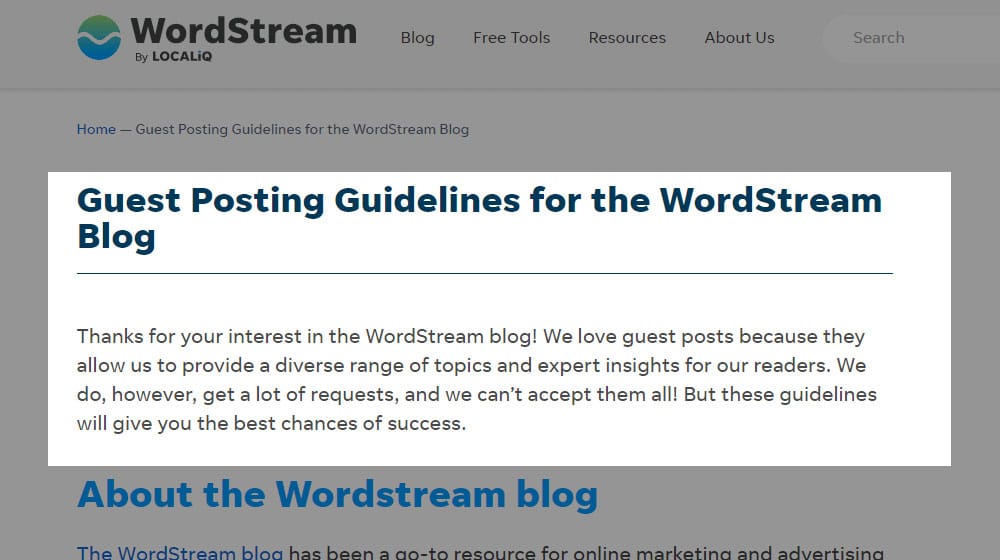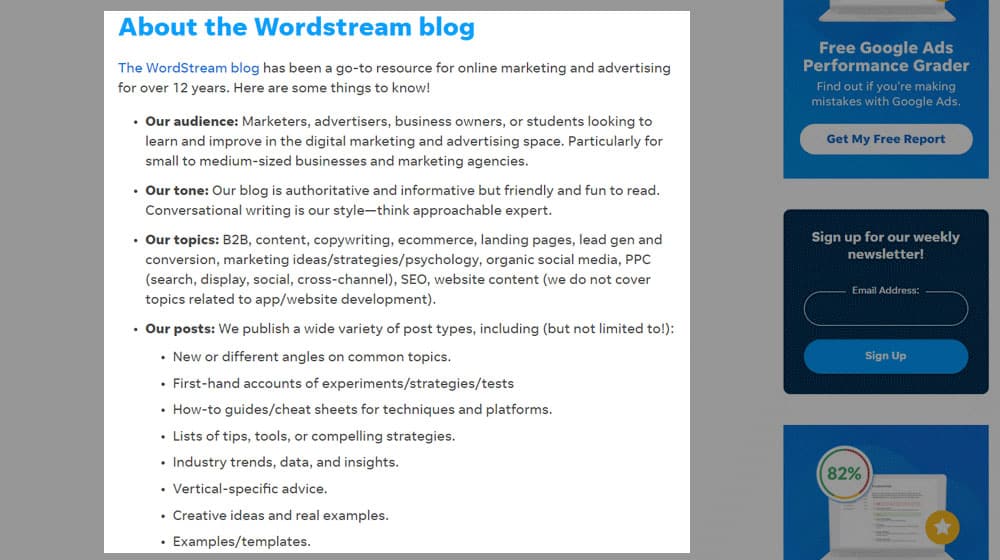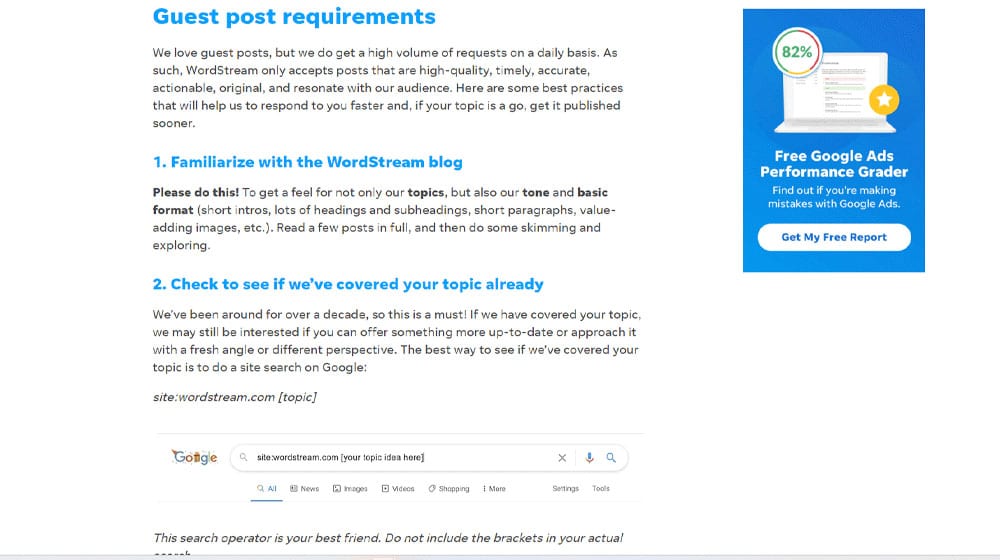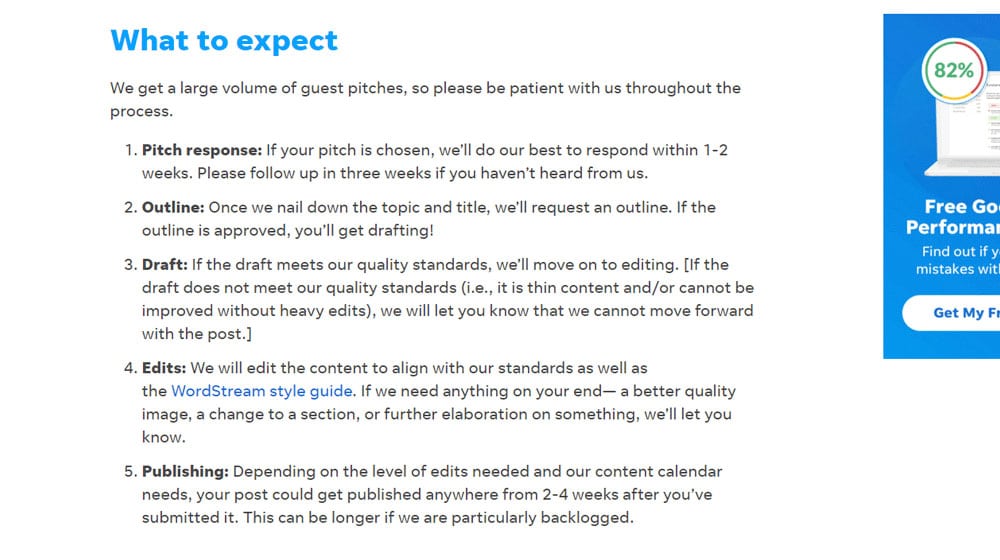When you have a website and a business online, one of your main goals is likely to grow your authority and reputation. Of the many ways to do that, content marketing is one of the most common. Running a blog with a regular posting schedule means filling it with a lot of top-tier writing, and if you're here, you're either hiring freelancers to do it, or you're considering it.
Freelancers aren't the only way to get high-quality writing for your blog, though. Another option is guest posts.
 Guest posts are posts from people who aren't affiliated with your site. You typically don't pay them anything (though some sites do), and in return, they receive free exposure and potentially a link from your site.
Guest posts are posts from people who aren't affiliated with your site. You typically don't pay them anything (though some sites do), and in return, they receive free exposure and potentially a link from your site.They're meant to be an example of an authority in your niche stepping in and contributing to your site because they recognize you as a worthy venue they can use to promote themselves. You accept it because, hey, having that authority post on your site gives you some of their authority and audience. They'll likely share and link to the post they made, giving you a boost in the process.
Plus, a relationship that starts with a guest post can expand into networking and partnerships down the road. Not every guest post will lead to such a deal, but some can, and that's a good opportunity to keep in mind.
With guest posting, you have to decide how you want to go about it. You're the publisher in this equation, and you generally have three options.
As you might guess from the title of today's post, we're talking about the third one today. You want to set up a guest post guidelines page, listing out the rules and expectations you have for guest posts to be successfully published on your site. This page should have a handful of specific elements, but what are they? Let's discuss.
Your guest post guidelines page should be largely a list of rules that any potential contributor should comply with if they want to be published on your site.
There are two main purposes for this page.
 The first is to attract people who might be interested in guest posting but who otherwise wouldn't think to solicit you for the chance.
The first is to attract people who might be interested in guest posting but who otherwise wouldn't think to solicit you for the chance.Many people assume rejection from sites that don't mention accepting guest posts, and it's better not to waste everyone's time by trying when you're doomed to fail.

 The second purpose is to codify your standards, desires, format, and other rules.
The second purpose is to codify your standards, desires, format, and other rules.If you want every post on your site to be 2,000+ words, you don't want to accept a 1,000-word guest post. If you want everyone to write about topics relevant to your niche, you don't want someone stepping in with something unrelated. These rules help you filter out and ignore or reject the pitches that clearly don't comply.
Here are the most important elements of a guest post guidelines page.
The first section of your guidelines page should introduce who you are, what you do, and who you would want to guest post on your site.

You can also outline the benefits of guest posting on your site and set expectations for what a potential contributor might need to have or do to be accepted.
Thank you for your interest in contributing to BrandNameBlog! We're a boutique agency working with high-end clients in <niche> and are among the foremost leaders in <industry>. By partnering with us, you gain exposure to our audience of <number of monthly actives> and a mention from one of the top agencies in <industry>.
Our clientele expects the exceptional from us, so we expect the same from our contributors. If you have what it takes to create awesome content, keep on reading! We'd love to hear from you.
Of course, your introduction shouldn't make claims that aren't true. If you're a small-time business just trying to get off the ground, calling yourself an industry leader won't quite resonate, for example. By adding specific statistics like your monthly users, you can show potential guest contributors what kind of audience you're likely to have.
The second section of your guest post guidelines should be a rundown of the kinds of topics and coverage you want from a contributor.

This outlines the broad range of topics and formats you accept and potentially calls out specific kinds of posts you don't want to publish.
In general, we accept blog posts on marketing of any kind, as long as it's relevant and can be justified. However, we greatly prefer topics in B2B marketing, case studies, growth hacks, small business growth strategies, and SEO/Content Marketing content.
You can also include a section that helps potential contributors filter their submissions or tailor them toward your audience.
When you're brainstorming ideas for guest contributions, ask yourself: will this topic be beneficial to our audience (<description of your main focus topics for your audience>), and will it provide actionable, useful information for them to use? Are you qualified to write about the topic with authority? Do you have unique information or insight that can be of value, not just to our visitors, but to the industry as a whole? If you think so, please get in touch.
You may also want to specify whether or not you're primarily trying to get guest posts from other companies or if freelance writers looking to build their own brands are acceptable as well. You can also include links to alternative options for, say, applying to become a writer for your site or paying for a sponsored post.
The following section should go into more detail about what makes a good guest post and what guidelines you want your contributors to comply with if they want a post to be successful.

Here's an example of this section:
Detail: Every guest post we publish is in-depth and detailed. Surface-level and beginner's content need not apply. If it's something you can see already in the top few posts of Google, it's not uniquely valuable enough for us.
Length: Minimum 1,500 words of in-depth content. Our typical blog post is 2,000 words long, and we want your content to fit right in. Depending on the topic, some shorter posts may be acceptable, and longer posts might as well.
Tone and Style: Conversational style is important. This isn't academic content. Our audience is knowledgeable, so don't speak down to them or go over their heads with jargon. Keep it PG-13, too.
Informative, not Sales: Our audience trusts us to be informative, and they don't read our blog to have some product shoved in their faces. Any guest post that primarily promotes a product or service will be rejected.
Well-Cited: Whenever you make a claim, back up that claim with data. We want to see cited sources unless you performed the research yourself, in which case, provide your data if possible.
Original: We do not syndicate content, and we do not publish content that is copied from somewhere else. The occasional quote is fine; a full copied section or post is not. We'll be checking!
Obviously, our rundown here is just an example. You can change this to be more or less strict, depending on what you want or need out of your contributors. If you want to syndicate content, that's fine too, but be aware that you need to handle the technical SEO aspects of that (like canonicalization) properly, or else you risk penalizing your site.
This is where you have some decisions to make. One of the biggest is how much input you want to have in the content creation process.
Generally, there are three "tiers" of processes that are common in guest posting.
In general, the closer to title-first you start, the more control you have over the resulting content. At the same time, though, this can feel very micromanage-y and can take up a lot of your time and energy managing it all.
On the other hand, full-post submissions might open you up to less well-aligned content you accept just because it's easy and decently written. It does turn off some contributors because it's a lot of effort up-front if the post gets rejected, but a good guest contributor can use the content elsewhere if you reject it, so it's not the worst thing in the world.

This section also specifies how you want to receive your potential guest posts.
Finally, have your contributor write themselves a bio. You don't necessarily want to do the research into who they are to write one for them, but you'll probably want to have one. Optionally, ask them for a headshot to attach to it as well.
At the end of the day, it's important to remember that all of this is completely customizable. You can have whatever process you want, whatever guidelines and restrictions you want, and you can customize all of it. Our guidelines and rundown here is just one example.
Here are some other real-world examples you can use for inspiration:
Each one of these is a similar setup but a different process, a different level of guidelines, and a different format. It just goes to show that pretty much anything will work.

The keys, more than anything, are in the keywords. You want to have a specific phrase like "write for us" or "submit a guest post" somewhere on your page, usually in the URL and the H1 headline, so that people who want to reach out can find you via Google. You'll also want to link to it from your main homepage, navigation, or footer somewhere, so it's easy to find.
All that said, it's pretty easy to put together a guest post guidelines page. The hard part is deciding on your process.
Don't worry, though; you can always change as you decide you don't like how it's working down the line!
We encourage you to share this article on Twitter and Facebook. Just click those two links - you'll see why.
It's important to share the news to spread the truth. Most people won't.